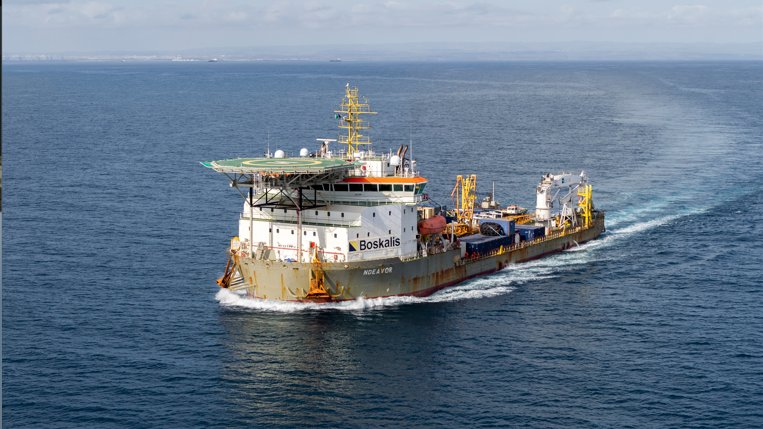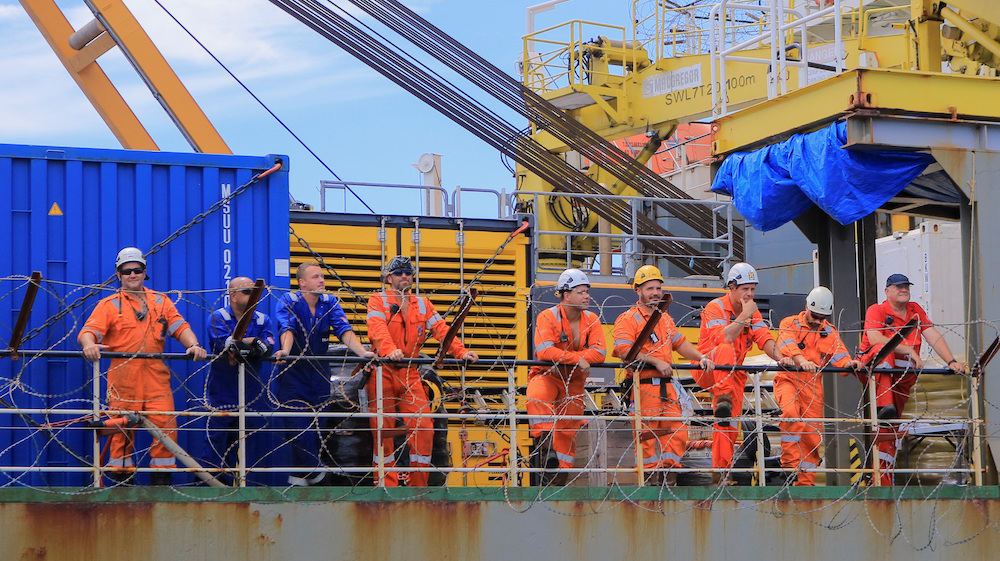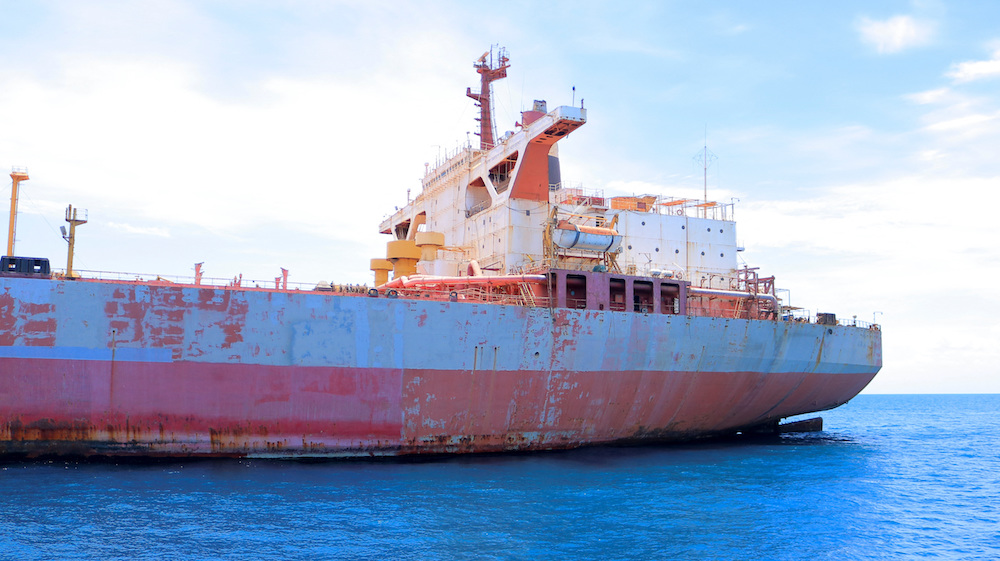NEW YORK CITY: Unless there are complications, the transfer of crude from the FSO Safer, an oil-storage vessel stricken off Yemen’s Red Sea coast, will be complete within 10 to 14 days, David Gressly, the UN resident coordinator for Yemen, told Arab News.
Speaking via VideoLink on Tuesday from aboard the Ndeavor, a crude carrier recently purchased by the UN for its operation, Gressly said that an additional $14 million was needed “immediately” and a remaining total of $29 million to complete the operation and eliminate the ecological threat.
The Ndeavor left Djibouti on Monday and docked at Yemen’s Hodeidah port before proceeding to the Safer’s offshore mooring on Tuesday, where it will begin the delicate process of removing 1.1 million barrels of oil, which are at considerable risk of spilling into the sea.
Once this ticking ecological time bomb has been secured, saving Red Sea ecosystems and fishing communities up and down the coast from almost certain disaster, the Ndeavor will tow the Safer to a “green scrapping yard.”
Achim Steiner, administrator of the UN Development Programme, which is leading the operation as part of a UN-coordinated initiative, called it a “very special day (and) a truly critical milestone for those who have been following the saga of the FSO Safer for years.”

The support vessel Ndeavor en route to the Red Sea after UNDP and Boskalis signed the contract for the company's subsidiary SMIT Salvage to transfer 1.1 million barrels of oil from the decaying FSO Safer to a replacement vessel. (Supplied)
The Ndeavor’s arrival is “simply one more step in a very critical complex operation, but it’s a great signal both for the people and the planet, really, in Yemen, in the Red Sea, but also for this idea that multilateralism, in this moment the UN, truly is illustrating what it means to take preventive action,” Steiner said.
“Nothing could be a more drastic illustration of what it means to stop this catastrophe potentially from happening. And doing so at the fraction of the cost that it would take to clean up an oil spill of this magnitude.”
The 47-year-old Safer has had little or no maintenance since the war in Yemen began in 2015 and has deteriorated to such an extent that experts fear it is in imminent danger of springing a leak, catching fire, or exploding.
The UN has warned that a spill could be four times bigger than the 1989 Exxon Valdez disaster off the coast of Alaska, which is considered the world’s worst oil spill in terms of environmental damage.
Experts estimate a major leak from the Safer could severely damage Red Sea ecosystems upon which around 30 million people depend for a living, including 1.6 million Yemenis, according to the UN.
Such a spill would devastate fisheries along Yemen’s west coast and destroy livelihoods in fishing communities, many of which are already dependent on humanitarian assistance in order to survive owing to the war.

Staff of a vessel in charge of unloading oil from the decaying vessel FSO Safer are pictured off the coast of Ras Issa, Yemen, prior to the start of an operation led by the United Nations to avoid an oil spill in the Red Sea. (AFP)
A spill could also disrupt commercial shipping on the Red Sea, one of the world’s busiest waterways, which accounts for 10 percent of all global trade, and could adversely affect littoral states, including Saudi Arabia, Djibouti and Eritrea.
If a fire broke out aboard the rusting vessel, more than 8.4 million people could be exposed to toxic pollutants.
The salvage operation has been split into two phases. First, the oil will be transferred to a replacement tanker, Nautica, before it is then moved to a permanent storage facility until the political situation in Yemen allows for it to be sold or moved elsewhere.
Although the Ndeavor’s arrival at the site of the Safer marks an important milestone, Gressly was quick to call this “just the first step of the operations,” adding that many steps remain before the work is finished.
“We need to get the (Safer) prepared for the transfer of oil (and) bring in the new vessel to receive the oil,” he said.
“We need to detach the old vessel, tow it away for scrapping, and then bring in a lay that will be used to attach the new vessel to the pipeline. Until all four pieces are complete, we really won’t have a fully secure oil storage and protection for the environment.”

Decaying vessel FSO Safer is moored off the coasts of Ras Issa prior to the start of an operation led by the UN to unload it, in the Red Sea. (AFP)
Gressly highlighted the “very volatile environment that we’re working in, politically and security-wise,” adding that it would be “naive to believe that we’d be able to do all of this without any hiccup or obstacle.”
However, “we have so far been able to overcome every obstacle that has come our way,” he said, thanking the Yemeni government for its support.
“Even though the parties are in conflict, the fact that they see the greater danger and greater belief to contribute that they put in $5 million of their own funding to this project, I think shows how everybody can come together to confront a common threat,” he said.
Gressly thanked Saudi Arabia, the Netherlands, Germany, the US, the UK, the EU, and 19 other states for their contributions. He also thanked Djibouti for hosting the operation, various firms that contributed to the UN effort, and the “very significant contribution of Egypt’s Suez Canal authorities, which have provided free passage for the Ndeavor.”
Indeed, reaching this point has been an extremely long slog, with political and financial barriers along the way. “Often people ask why is it taking so long,” Steiner said.
IN NUMBERS
* 1.1 m Barrels of oil stored aboard the FSO Safer.
* $114m Money raised by UN for salvage operation.
* $29m Money needed to complete the operation.
* 30 m People who might have been affected by a leak.
“Let me tell you, with the arrival of the Ndeavor, we mark an extraordinarily intense process of trying to first of all, in the negotiations led by David (Gressly) in Yemen with all the parties concerned, to create the conditions and an agreement within which we could actually mount such a salvage operation.”
Then the team had to mount “a major fundraising operation that leads us to, at this point in time, having almost secured the majority of the funding — the total cost for the two phases or the two parts of this operation are about $142 million.
“For the emergency phase, which is literally to get the oil off the FSO Safer, we are still missing $14 million, and this is something that we are trying desperately to secure in the next few days in order to be able to complete that phase.
“We had also to secure a large vessel that is essentially uniquely built for the purpose of transporting oil, and in today’s marketplace that proved almost impossible. Prices have doubled and vessels were unavailable.
“We finally managed to secure one and purchase it even though we were not yet clear whether we could get all the funding.”

Left: Achim Steiner, administrator of the UN Development Programme; Right: David Gressly, the UN resident coordinator for Yemen. (Supplied)
In order to source the required funding, “enormous and complex preparatory steps had to be taken over the last few months from actually finding your shipbroker, maritime lawyers, oil spill experts, developing contingency plans, security plans, and negotiating insurance policies,” said Steiner.
“In fact, we completed only on Friday evening at midnight the negotiation of the necessary insurance policy package, which then allowed us to immediately give the signal for the Ndeavor to depart early Monday morning sunrise from Djibouti and arrive there (on Tuesday).”
Asked by Arab News why the relatively meager sum needed for the salvage operation had proven so difficult to raise, Steiner said: “There are certainly, in the corporate world and in the sectors from shipping to oil and gas, extraordinary moments of profitability. And I think this is one reason why we also had hoped that there would be a stronger stepping forward.
“Having said that, the International Association of Oil and Gas Producers has pledged $10 million and we are working the phones right now. Let’s say to CEOs: ‘Come on. We have to close this gap right now.’ Even school children in Maryland have donated to this. It would be truly an ironic and missed opportunity not to step up.”
It was not only the matter of funding that held up the operation. For years, the Houthi militia, which controls whole swathes of Yemen, including Hodeidah, had been causing delays, preventing experts from assessing the condition of the Safer and making emergency repairs.
The militias repeatedly made new demands focusing on logistics and security arrangements.
“We understand that many member states, including donors to the project, are extremely concerned by these new delays. We, of course, share those concerns,” Stephane Dujarric, spokesman for UN Secretary-General Antonio Guterres, told a press briefing in 2021.

The support vessel Ndeavor en route to the Red Sea after UNDP and Boskalis signed the contract for the company's subsidiary SMIT Salvage to transfer 1.1 million barrels of oil from the decaying FSO Safer to a replacement vessel. (Supplied)
Frustrated is not the right word for how negotiators feel, he said at the time, adding: “I think ‘increased worry’ is the right expression.
“We’ve been talking about this for two years now. By the grace of God, there has not been a major leak. The more we wait, the chances of a major leak are increasing. Time is not on anyone’s side.”
Gressly says that ever since the Houthis signed an agreement with the UN in March 2022, they have been cooperating. “I am confident they will continue to honor that (agreement),” he told Arab News.
And although the Houthis are not involved in the direct implementation of operations, they are involved “in securing the perimeter. They’re involved in discussions with us on how this will be done. And they are very much involved in the details as well.
“We’ve worked in great detail over the last few weeks with them to go through each of the steps so that they’re comfortable with everything. They have their own technical experts as well. Good expertise, actually, both in Aden and Sanaa.”
Gressly paid tribute to the crew — “probably poorly paid and supported” — that has kept the Safer afloat for the past several years.
“In fact, we met one of them today. And I had to congratulate him as one of the unsung heroes of the FSO Safer because they’ve been keeping this thing afloat while we figured out how to organize this kind of rescue.”





























